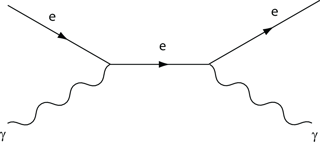How can I prove that the relativistic energy and the impulse cannot be conserved if an electron, which is essentially free, absorbs all the energy of the incident photon?
-
1$\begingroup$ It can't. Such an event would violate either energy or momentum conservation. $\endgroup$– dmckee --- ex-moderator kittenCommented Apr 5, 2016 at 5:00
-
4$\begingroup$ Also physics.stackexchange.com/questions/231175/… and physics.stackexchange.com/questions/81448/… $\endgroup$– ProfRobCommented Apr 5, 2016 at 12:37
1 Answer
Compton scattering discovered by Arthur Holly Compton, is the inelastic scattering of a photon by a charged particle, usually an electron
Here is the compton scattering diagram
time goes from left to right.
A Feynman diagram representing the γe→γe process. In the classical limit, this is called Thomson scattering. The quantum version is called Compton scattering, and in the relativistic regime, the result is given by the Klein-Nishina formula.
You are asking whether all the momentum and energy can be absorbed by the outgoing electron. One can go to the limit where the frequency of the gamma approaches zero .Classically it is when two balls collide and all the momentum and energy are transferred to the second ball, and yes, it is allowed: the incident photon angle and the outgoing electron angle approach zero at the limit. A very soft gamma is necessary for angular momentum conservation .

